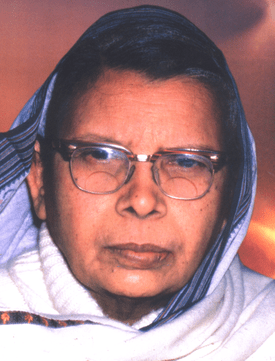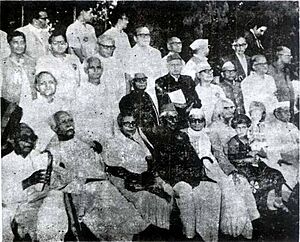Mahadevi Varma facts for kids
Quick facts for kids
Mahadevi Varma
|
|
|---|---|
 |
|
| Born | 26 March 1907 Farrukhabad, United Provinces of Agra and Oudh, British India |
| Died | 11 September 1987 (aged 80) Allahabad, Uttar Pradesh, India |
| Occupation | Poet, essayist and sketch story writer |
| Alma mater | Allahabad University |
| Literary movement | Chhayavaad |
| Notable works |
|
| Notable awards | 1956 Padma Bhushan 1982 Jnanpith Award 1988 Padma Vibhushan |
| Spouse | Vikas Narayan Singh |
| Signature | |
 |
|
|
|
|
Mahadevi Varma (born March 26, 1907 – died September 11, 1987) was a famous Indian writer. She wrote poems, essays, and short stories in Hindi. She is known as one of the four main writers of the Chhayawadi period in Hindi literature. People sometimes called her the "Modern Meera".
Another famous poet, Nirala, once called her "Saraswati in the vast temple of Hindi Literature." Mahadevi Varma saw India before and after it became independent. She was a poet who cared deeply about Indian society. Her writings showed her poetry and her work to help women. These ideas greatly influenced readers and critics.
Mahadevi Varma made Hindi poetry in Khadi Boli sound softer. Before her, this style was mostly used in Braj bhasha. She was also good at music. Her songs were beautiful and expressed strong feelings in a gentle way.
She started her career as a teacher. She became the Principal of Prayag Mahila Vidyapeeth. She was married but chose to live a simple, spiritual life. Mahadevi Varma was also a talented painter and translator. She received many important awards for her work in Hindi literature. She was respected throughout her life as a leading female writer. In 2007, her 100th birthday was celebrated. Google also honored her with a special Google Doodle.
Contents
Life and Education
Early Life
Mahadevi Varma was born on March 26, 1907. Her family was Hindu and lived in Farrukhabad, Uttar Pradesh, India. Her father, Govind Prasad Verma, was a college professor. Her mother, Hem Rani Devi, was very religious and loved music. She would read from holy books like the Ramayana and Gita for hours.
Her father was different; he was a scholar and loved music, but he was also an atheist and enjoyed hunting. Mahadevi Varma had close friends who were also famous poets, like Sumitranandan Pant and Suryakant Tripathi Nirala. It is said that Mahadevi Varma tied Rakhis to Nirala for 40 years.
School Days
Mahadevi Varma first went to a Convent school. But she didn't like it. So, she was moved to Crosthwaite Girls College in Allahabad. She learned about the power of unity there. Students from many different religions lived together in the hostel.
Mahadevi Varma started writing poems in secret. Her roommate and senior, Subhadra Kumari Chauhan, found her poems. Subhadra was already known for writing poems at school. This is how Mahadevi's talent was discovered.
While others used to play outside, me and Subhadra used to sit on a tree and let our creative thoughts flow together...She used to write in Khariboli, and soon I also started to write in Khariboli...this way, we used to write one or two poems a day...
Mahadevi and Subhadra sent their poems to magazines. Some of their poems were published. They also went to poetry seminars. There, they met famous Hindi poets and read their own poems. This friendship lasted until Subhadra finished college.
In her childhood story, Mere Bachpan Ke Din (My Childhood Days), Mahadevi Varma wrote that she was lucky. She was born into a family that was open-minded. This was at a time when many families saw a girl child as a burden. Her grandfather wanted her to become a scholar. However, he also wanted her to follow tradition and marry at age nine. Her mother knew Sanskrit and Hindi well. Mahadevi said her mother inspired her to write poems and love literature.
After she finished college in 1929, Mahadevi Varma did not want to live with her husband, Swarup Narain Verma. They were very different. She did not like his hunting or eating meat. She had been married as a child. It was the custom to live with her husband only after finishing her education. But when she finished her BA, she refused. Her father offered to help her get a divorce and remarry. But she said she wanted to stay single. She even tried to convince her husband to remarry. Later, she thought about becoming a Buddhist nun. But she decided not to. She did study Buddhist texts as part of her master's degree.
Professional Career
Literary Works
Nihar was Mahadevi Varma's first collection of poems in 1930. She then wrote Rashmi in 1932 and Neerja in 1933. In 1935, her poem collection Sandhyageet was published. In 1939, four of her poetry collections were published together as Yama.
She also wrote 18 novels and short stories. Some of her famous prose works include Mera Parivar (My Family), Smriti ki Rekhaye (Lines of Memory), Patha ke Sathi (Path's Companions), Srinkhala ke Kariye (Series of Links), and Atit ke Chalachrit (Past Movies). She is also seen as a pioneer of feminism in India.
Helping Women

Mahadevi Varma spent her career writing, editing, and teaching. She helped a lot in developing the Prayag Mahila Vidyapeeth in Allahabad. Taking on this role was a big step for women's education at that time. She also served as its Principal.
In 1923, she took over Chand, a leading magazine for women. In 1955, Varma started the Literary Parliament in Allahabad. She also became the editor of its publication with Ilachandra Joshi. She helped start conferences for women poets in India.
Mahadevi was greatly influenced by Buddhism. She was also inspired by Mahatma Gandhi. She joined public service and worked in Jhansi during the Indian freedom struggle. In 1937, Mahadevi Varma built a house in a village called Umagarh, Ramgarh, Uttarakhand. She named it Meera Temple. She worked there for the village people and their education. She did a lot for women's education and helping them become financially independent. Today, this house is known as the Mahadevi Sahitya Museum.
She encouraged women to be brave and work for their freedom and development. She spoke out against old social rules. This made her known as a woman liberationist. She was also called a social reformer because of her work for women and their education. Her writings show a strong desire for change in society. They also show her deep love for development, not sadness or pain.
In her work Hindu Stree Ka Patnitva (The Wifehood of Hindu Women), she compared marriage to slavery. She wrote that women were made to be wives and mothers. They had no political or financial power. Her work for women's rights is sometimes less noticed because of her famous poetry.
She lived most of her life in Allahabad (Prayagraj), Uttar Pradesh. She passed away in Allahabad on September 11, 1987.
Works
Mahadevi Varma was a poet and a great prose writer. Here are some of her works:
Poetry
- Nihar (1930)
- Rashmi (1932)
- Neerja (1933)
- Sandhyageet (1935)
- Pratham Ayam (1949)
- Saptaparna (1959)
- Deepshikha (1942)
- Agni Rekha (1988)
Other poetry collections by Mahadevi Varma also exist. They contain selected songs from the works listed above.
Prose
Here is a list of some of her prose works:
- Ateet Ke Chalchitr (1961)
- Smriti ki Rekhaye (1943)
- Patha ke Sathi (1956)
- Mera Parivar (1972)
- Sansmaran (1943)
- Sambhasan (1949)
- Shrinkhala ki Kadiyan (1942)
- Vivechamanak Gadya (1972)
- Skandha (1956)
- Himalaya (1973)
For Children
Mahadevi Varma also wrote two collections of poems for children:
- Thakurji Bhole Hai
- Aaj Kharidenge hum Jwala
Awards and Honors
- 1956: Padma Bhushan
- 1979: Sahitya Akademi Fellowship
- 1982: Jnanpith Award for her poetry collection Yama.
- 1988: Padma Vibhushan
In 1979, the famous Indian filmmaker Mrinal Sen made a Bengali film. It was based on her memoir Woh Chini Bhai and was called Neel Akasher Neechey. On September 14, 1991, the Indian Postal Department released a special stamp. It honored her along with Jaishankar Prasad.
Literary Contributions
Mahadevi Varma became famous in literature when the Hindi language Khadi Boli was being developed. She brought the softness of Braj bhasha to Hindi poetry. She gave us many songs that showed Indian philosophy. She did important work in language, literature, and philosophy. This work later influenced many writers.
She created a special rhythm and simplicity in her songs. She also used symbols and images that helped readers imagine what she was describing. Her work was very important for the success of Chhayavadi poetry. Jaishankar Prasad made Chhayavadi poetry natural. Suryakant Tripathi Nirala brought freedom to it. Sumitranandan Pant added delicate art. But Varma gave life to Chhayavadi poetry.
The main features of her poetry are strong emotions and deep feelings. She could show the smallest feelings of the heart in a lively way. This makes Varma one of the best Chhayavadi poets. People remember her speeches in Hindi with respect. Her speeches showed kindness for common people and were full of truth. She was the chief guest at the closing ceremony of the 3rd World Hindi Conference in Delhi in 1983.
Besides her original writings, she was also a creative translator. One of her translations is Saptaparna (1980). She used her knowledge of culture to present 39 important Hindi poems in this work. She connected them to the Vedas, Ramayana, Theragatha, and works by writers like Ashwaghosh, Kalidas, Bhavabhuti, and Jayadeva. In the beginning, in a 61-page section called Apna Baat, she shared deep research. This work enriched Hindi literature and thinking, not just writing by women.
See also
- Chhayavaad
- Jaishankar Prasad
- Suryakant Tripathi 'Nirala'
- Sumitranandan Pant


